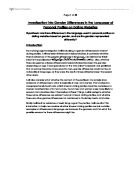How does language reflect social differences? Katherine Pearce
Your answer should include references to
Age
Gender
Social class
Within and between languages, social divisions are created when there are differences. This can lead to stereotyping of different kinds, such as gender stereotypes- especially for women along with a “sexist” language, social class stereotypes- i.e. different languages or forms of language relate to different social class, and regional stereotyping of different accents within a language.
The accent and dialect of a person triggers different first impressions of people. Some accents within a language can be seen as more desirable and higher social class than others. Sapir and Whorf claimed that when children learn their native language they also learn a particular view of the world. Therefore our language must influence how we think, and this is called linguistic relativity. For example Standard English is the dialect used typically by middle to upper class, and is the language that is taught in schools in the UK, as it is bound to no particular region. Received Pronunciation is the accent that is coupled with this dialect and together they form a type of English that stereotypically to many comes across as very desirable middle class, well spoken and usually well educated, however it is only spoken by approximately 3% of the population. This is usually seen as a more desirable accent and dialect than most regional forms, such as a Birmingham accent which can often be perceived as generally less attractive and even less intelligent than other dialects and accents. This is called the Inherent Value hypothesis; however the Social Connotations Hypothesis states that Standard English and Received Pronunciation are no better or effective than any other dialect.








